
So, the Golden Globes got me feeling all
down. Which is too bad, since the last twelve months at the movies already had a strong tendency to bend that way, either
because of subject matter (Children of Men, An Inconvenient Truth, The Good Shepherd, Deliver Us from
Evil, Iraq in Fragments, Fast Food Nation, United 93) or because of execution (Apocalypto,
Idlewild, The Good German, Hard Candy, Stranger Than Fiction, Snakes on a Plane) or both
(Manderlay, Why We Fight, and World Trade Center).
As a temporary but spirit-lifting salve, and also as a placeholder for my upcoming Best of 2006
feature, I thought I'd remind the world, or at least the blogosphere, or at least my friends, or at least myself, that the
movies occasionally knew how to throw a party in 2006, even if the HFPA didn't. The following ten films, some of
which were great, all of which were good, slapped the biggest, most constant smiles on my face while I was sitting in the
movie theater. I think because I write such long, academic reviews, and because I put so much emotional and
intellectual pressure on movies to be so many things in my life, I am often asked why I can't, or won't, "just sit back and
enjoy" what I'm watching. My most sincere answer to this, as my students know, is that I actually think that objects of
love—which for me include bad movies as well as good ones—prompt us to want to know more rather than less
about how they work, who they are. My friends who like sports never tire of statistics and minutiae and possible trades
and fantasy playbooks, and these knowledges seem to draw them into the excitement of the game rather than chuting
them out of it. My friends who know (and love) cars or cooking or math or travel or clothes or landscapes or medicine or
music feel the same way.
For me, it's movies. I don't want to "turn my brain off," whatever that means. However, I do know a pleasure cruise when
I'm on one, and if you're ever haunting the video stores, wondering what to rent when you're looking for an effusive, energizing
good time, these are the titles I'd recommend from 2006:
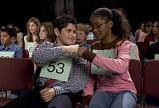 Akeelah and the Bee Effectively distinguishing itself
from the recent run of spelling-bee entertainments, and also from your typical pre-teen flick, Akeelah offered simple
but plausible and appealing characters, and a satisfying, well-wrought script with its share of modest tests and turns.
Akeelah, charmingly played by Keke Palmer (a real actress, not just a smiling placeholder), brimmed with pluck, maturity,
and intelligence—the kinds of qualities I found sorely lacking Ofelia in Pan's Labyrinth, which is obviously a
completely different film, but which needed some of Akeelah's palpable sense of what childhood is, instead of some
stylized, highfalutin idea of what childhood represents. Without diminishing their inner lives or their credible conflicts, Akeelah
and her circle of friends and family provided warm, illuminating companionship for two hours; while congeniality is not an
inherently necessary quality in a movie, nor any kind of prerequisite for critical praise, I was impressed by the movie's
generosity and agility, even as it bumped up against some stereotypes (the Asian martinet) and softened some of its messier
edges (the gangster brother). I admit that I also enjoyed watching a movie that plays splendidly
to almost any age group, and the climactic spelling bee is a real nail-biter, for more reasons than you might expect.
Capsule Review
Akeelah and the Bee Effectively distinguishing itself
from the recent run of spelling-bee entertainments, and also from your typical pre-teen flick, Akeelah offered simple
but plausible and appealing characters, and a satisfying, well-wrought script with its share of modest tests and turns.
Akeelah, charmingly played by Keke Palmer (a real actress, not just a smiling placeholder), brimmed with pluck, maturity,
and intelligence—the kinds of qualities I found sorely lacking Ofelia in Pan's Labyrinth, which is obviously a
completely different film, but which needed some of Akeelah's palpable sense of what childhood is, instead of some
stylized, highfalutin idea of what childhood represents. Without diminishing their inner lives or their credible conflicts, Akeelah
and her circle of friends and family provided warm, illuminating companionship for two hours; while congeniality is not an
inherently necessary quality in a movie, nor any kind of prerequisite for critical praise, I was impressed by the movie's
generosity and agility, even as it bumped up against some stereotypes (the Asian martinet) and softened some of its messier
edges (the gangster brother). I admit that I also enjoyed watching a movie that plays splendidly
to almost any age group, and the climactic spelling bee is a real nail-biter, for more reasons than you might expect.
Capsule Review
 Casino Royale That opening pursuit, breathless and
brutal and high-flying, with acrobatics and aerial vistas just this side of heaven? The deliciously hammy elegance of the
poker game, rubbing up against the thrilling ambush in the hotel hallway? The sexy, mind-over-matter sparkle of Eva Green,
and the miracle by which Daniel Craig looks even better in clothes than out of them? The ruddy insolence of Bond's
personality, and of the movie's dogged reinvention of the character? For my money, James Bond was much more richly and
surprisingly "humanized" this year than Queen Elizabeth II was, and the film courts and rewards its audience succulently
without verging too much on the predictable. I wish the last third didn't sputter so badly; the romance and the action
and the centerfold physique spreads take on duller, sometimes crushingly literal forms, and too many characters start
crowding the story. Still, there's no denying the adrenal kick—or is it a direct shot to the heart?—behind
Casino Royale's best sequences and savviest impulses. From costumes to lighting to casting to fleeting gestures,
Casino had a strong hand and, for the most part, played it thrillingly.
Casino Royale That opening pursuit, breathless and
brutal and high-flying, with acrobatics and aerial vistas just this side of heaven? The deliciously hammy elegance of the
poker game, rubbing up against the thrilling ambush in the hotel hallway? The sexy, mind-over-matter sparkle of Eva Green,
and the miracle by which Daniel Craig looks even better in clothes than out of them? The ruddy insolence of Bond's
personality, and of the movie's dogged reinvention of the character? For my money, James Bond was much more richly and
surprisingly "humanized" this year than Queen Elizabeth II was, and the film courts and rewards its audience succulently
without verging too much on the predictable. I wish the last third didn't sputter so badly; the romance and the action
and the centerfold physique spreads take on duller, sometimes crushingly literal forms, and too many characters start
crowding the story. Still, there's no denying the adrenal kick—or is it a direct shot to the heart?—behind
Casino Royale's best sequences and savviest impulses. From costumes to lighting to casting to fleeting gestures,
Casino had a strong hand and, for the most part, played it thrillingly.
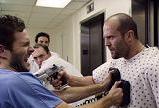 Crank In any other year, Casino Royale would
stake an easy claim on the trophy for Best Scene Involving an Improbably Deployed Defibrillator, but in this and many other
ways, Crank has got the jump on everything else at the multiplex. One is hard-pressed even to conceive of a movie
with more delirious energy, or with a more patently ridiculous premise, but Crank is the rare, blissful film to take
genuine creative flight from its own absurdity, rather than simply hardening and besmirching the giddy, childish motivations
at its core. The actors, an odd gaggle ranging from Jason Transporter Statham to Dwight Sling Blade Yoakam to
Amy Rat Race Smart to Efren "Pedro" Ramirez are all more than game, but it's the high-velocity cleverness of the
direction that sweeps you into the film. Until you've seen a man smash a waffle iron onto his own hand to stay awake, and
been effortlessly persuaded to accept this spectacle as comedy, you haven't lived. Crank is the vigilante
revenge thriller that the filthy, perky ironists of Avenue Q might have made, and the gifts keep on coming through
the very last frame.
Crank In any other year, Casino Royale would
stake an easy claim on the trophy for Best Scene Involving an Improbably Deployed Defibrillator, but in this and many other
ways, Crank has got the jump on everything else at the multiplex. One is hard-pressed even to conceive of a movie
with more delirious energy, or with a more patently ridiculous premise, but Crank is the rare, blissful film to take
genuine creative flight from its own absurdity, rather than simply hardening and besmirching the giddy, childish motivations
at its core. The actors, an odd gaggle ranging from Jason Transporter Statham to Dwight Sling Blade Yoakam to
Amy Rat Race Smart to Efren "Pedro" Ramirez are all more than game, but it's the high-velocity cleverness of the
direction that sweeps you into the film. Until you've seen a man smash a waffle iron onto his own hand to stay awake, and
been effortlessly persuaded to accept this spectacle as comedy, you haven't lived. Crank is the vigilante
revenge thriller that the filthy, perky ironists of Avenue Q might have made, and the gifts keep on coming through
the very last frame.
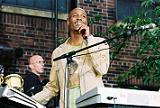 Dave Chappelle's Block Party When
this film inevitably appears on my Top Ten List for 2006, I will enthuse more directly about its potent but unpushy politics
of community, stressing a hopeful, homespun, temporary spirit of collectivity over instead of a broad or naïve utopianism.
I'll also have something to say about the impressively beautiful and artfully framed cinematography of Ellen Kuras, working
on the fly under uniquely boisterous circumstances. For now, though, I prefer to call attention to how goddamn fun this movie
is, wheeling amongst our inspired host's hilarious improvisations, rimshot jokes, rap battles, and picaresque interactions
with smalltown and big-city Americans of several stripes. Supplementing the humor are the fun throwaways within and around
the concert, provided by the artists (Erykah Badu tossing her enormous Afro-wig right off her head) as well as the audience
members (as when two black teenagers recount how they turned the other cheek from a racist diatribe on an Ohio golf course
so they wouldn't jeopardize their tickets to Dave's Brooklyn jam). My favorite moment in the movie, though, is without a doubt
the arrival of the reunited Fugees on Dave's stage, which drops with the energy and also the poignancy of a stitch-in-time
celebration, bestowing on the fleeting, present moment a relic of a very recent, possibly funkier, certainly more hopeful
past. Remember when we weren't at war, votes still counted, the vice president had a platform instead of a shotgun, and the
fu-gee-la was the way that we rocked when we were doing our thing? Want to live that spirit again, with spirit and soul?
Here's the movie for you.
Dave Chappelle's Block Party When
this film inevitably appears on my Top Ten List for 2006, I will enthuse more directly about its potent but unpushy politics
of community, stressing a hopeful, homespun, temporary spirit of collectivity over instead of a broad or naïve utopianism.
I'll also have something to say about the impressively beautiful and artfully framed cinematography of Ellen Kuras, working
on the fly under uniquely boisterous circumstances. For now, though, I prefer to call attention to how goddamn fun this movie
is, wheeling amongst our inspired host's hilarious improvisations, rimshot jokes, rap battles, and picaresque interactions
with smalltown and big-city Americans of several stripes. Supplementing the humor are the fun throwaways within and around
the concert, provided by the artists (Erykah Badu tossing her enormous Afro-wig right off her head) as well as the audience
members (as when two black teenagers recount how they turned the other cheek from a racist diatribe on an Ohio golf course
so they wouldn't jeopardize their tickets to Dave's Brooklyn jam). My favorite moment in the movie, though, is without a doubt
the arrival of the reunited Fugees on Dave's stage, which drops with the energy and also the poignancy of a stitch-in-time
celebration, bestowing on the fleeting, present moment a relic of a very recent, possibly funkier, certainly more hopeful
past. Remember when we weren't at war, votes still counted, the vice president had a platform instead of a shotgun, and the
fu-gee-la was the way that we rocked when we were doing our thing? Want to live that spirit again, with spirit and soul?
Here's the movie for you.
 The Departed
I don't really think of The Departed as a "return" to form for Martin Scorsese—not because I'm any more enamored
of the clod-hopping Gangs of New York or the inconsistent Aviator than I was when they
debuted, but because The Departed doesn't seem much like the movies Scorsese was making when consensus placed him at
the top of his game. Less bold and trenchant than Taxi Driver, less risky and introspective than New York, New York,
less aggressively virtuosic than Goodfellas, The Departed has the brilliant gleam but the limited depth of a
recently washed window, as well as a kinetic, mall-friendly awareness that what we're seeing is most of what we're getting;
the stakes and ideas don't extend much further than the screen.
Within those parameters, though, Scorsese recovers the same boundless energy and formal conviction that he brought to Cape
Fear, his last exercise in thrilling revisionism, and not coincidentally his biggest hit until The Departed. Edited
with snap, nerve, and deftly unpredictable rhythms by Thelma Schoonmaker (who seems just as liberated as Scorsese by backing away from
Oscar-bait material), acted by a cast who meld the spontaneous energy of first-take improvisers with the gravity and nuance
of a carefully rehearsed repertory company, The Departed commits with all of its considerable color and might to giving
everyone—the audience, the filmmakers, the Warner Bros. accountants—the best possible bang for their buck. And the
film's stamina is remarkable: just as we think the curtain is drawing near, Scorsese and scribe William Monahan keep calling third- and fourth-tier
characters into the spotlight, giving actors as good as Mark Wahlberg and Anthony Anderson a chance to alter our relationship
to the whole story. The original Infernal Affairs was comparably stylish and diverting, but not this delicious; it
didn't sate the moviegoing appetite as richly as The Departed does. Nearly everyone on screen dies, yes, but literally everyone in the theater wins.
The Departed
I don't really think of The Departed as a "return" to form for Martin Scorsese—not because I'm any more enamored
of the clod-hopping Gangs of New York or the inconsistent Aviator than I was when they
debuted, but because The Departed doesn't seem much like the movies Scorsese was making when consensus placed him at
the top of his game. Less bold and trenchant than Taxi Driver, less risky and introspective than New York, New York,
less aggressively virtuosic than Goodfellas, The Departed has the brilliant gleam but the limited depth of a
recently washed window, as well as a kinetic, mall-friendly awareness that what we're seeing is most of what we're getting;
the stakes and ideas don't extend much further than the screen.
Within those parameters, though, Scorsese recovers the same boundless energy and formal conviction that he brought to Cape
Fear, his last exercise in thrilling revisionism, and not coincidentally his biggest hit until The Departed. Edited
with snap, nerve, and deftly unpredictable rhythms by Thelma Schoonmaker (who seems just as liberated as Scorsese by backing away from
Oscar-bait material), acted by a cast who meld the spontaneous energy of first-take improvisers with the gravity and nuance
of a carefully rehearsed repertory company, The Departed commits with all of its considerable color and might to giving
everyone—the audience, the filmmakers, the Warner Bros. accountants—the best possible bang for their buck. And the
film's stamina is remarkable: just as we think the curtain is drawing near, Scorsese and scribe William Monahan keep calling third- and fourth-tier
characters into the spotlight, giving actors as good as Mark Wahlberg and Anthony Anderson a chance to alter our relationship
to the whole story. The original Infernal Affairs was comparably stylish and diverting, but not this delicious; it
didn't sate the moviegoing appetite as richly as The Departed does. Nearly everyone on screen dies, yes, but literally everyone in the theater wins.
 The Descent Neil Marshall's
spelunking nightmare isn't a literal remake like The Departed is, but you'd swear you've seen this movie at least a half-dozen
times before: endangered dames, dying flashlights, barely-glimpsed predators, sublimated rivalries figured as ghostly beasts.
Thankfully, what by all rights should feel like an opportunistic retread of Alien ground—or, worse, like a purgatorial
return to the moribund ground of The Cave—comes fabulously, frighteningly alive on-screen. I wouldn't want to make
extravagant claims on behalf of the writing, but the six women trapped beneath a few hundred meters of Appalachian soil do
translate as credible, particular people, making not just their plight but their tense histories and their desperate alliances
and betrayals into sites of real investment. In a sense, the cast only come into clear focus when things start to go wrong,
which is the exact juncture when many movies start swapping their banally differentiated characters into interchangeable carcasses.
The Descent looks great and is superbly paced, and it absolutely delivers the thrills, chills, and kills that it promises,
without falling casualty to the grossly popular Saw-style trend of torture as entertainment. The beats you see coming
in the narrative pay equal dividends to those you don't, and you won't soon forget the ending—which, for the record, I
prefer to the English original. Full Review
The Descent Neil Marshall's
spelunking nightmare isn't a literal remake like The Departed is, but you'd swear you've seen this movie at least a half-dozen
times before: endangered dames, dying flashlights, barely-glimpsed predators, sublimated rivalries figured as ghostly beasts.
Thankfully, what by all rights should feel like an opportunistic retread of Alien ground—or, worse, like a purgatorial
return to the moribund ground of The Cave—comes fabulously, frighteningly alive on-screen. I wouldn't want to make
extravagant claims on behalf of the writing, but the six women trapped beneath a few hundred meters of Appalachian soil do
translate as credible, particular people, making not just their plight but their tense histories and their desperate alliances
and betrayals into sites of real investment. In a sense, the cast only come into clear focus when things start to go wrong,
which is the exact juncture when many movies start swapping their banally differentiated characters into interchangeable carcasses.
The Descent looks great and is superbly paced, and it absolutely delivers the thrills, chills, and kills that it promises,
without falling casualty to the grossly popular Saw-style trend of torture as entertainment. The beats you see coming
in the narrative pay equal dividends to those you don't, and you won't soon forget the ending—which, for the record, I
prefer to the English original. Full Review
 Inside Man In the
cases of several Spike Lee movies, one hardly needs X-ray revision to spot the meridian running north-south through the movie,
partitioning the scenes and accents that are most organic to the material and those of which the primary goal is to keep the
director entertained, or to flatter his beliefs. One of the joys of Inside Man, then, is that these separate spheres
feel uncommonly well-fused—not just for a Spike Lee movie, but for any crowd-pleasing divertissement helmed by such a
talented and name-branded artist. Best of all, the "fusion" I am describing is culinary, not molecular: it's not that you
don't notice the film drawing on disparate energies or ranging across an unlikely array of tastes, but you'd have a hard time
removing any of these ingredients without fundamentally altering the dish. Thus, the jury stays out on whether Inside Man
commences with those ringing, opening chords of the Bollywood track "Chaiyya Chaiyya" for any reason beyond Spike Lee grooving
on a Bollywood track—but then, as the film increasing grounds its pleasures, its narratives, even its thematics in the
multicultural, heterogeneous landscape of modern New York, you see how well the soundtrack has served, even shaped, the movie.
An ebullient, playground spirit persists throughout, from Clive Owen's ingenious bout with a bank employee's cell-phone right
through that sexy, hat-twirling final shot. Is Inside Man the story of a crime prevented or a crime achieved? Of
hostages saved from peril or hostages entertained by the craft and smarts of their captors? Of Spike Lee reaching out to a
wider audience or of a wider audience finally "getting" Spike Lee? All of the above, brother-man.
Inside Man In the
cases of several Spike Lee movies, one hardly needs X-ray revision to spot the meridian running north-south through the movie,
partitioning the scenes and accents that are most organic to the material and those of which the primary goal is to keep the
director entertained, or to flatter his beliefs. One of the joys of Inside Man, then, is that these separate spheres
feel uncommonly well-fused—not just for a Spike Lee movie, but for any crowd-pleasing divertissement helmed by such a
talented and name-branded artist. Best of all, the "fusion" I am describing is culinary, not molecular: it's not that you
don't notice the film drawing on disparate energies or ranging across an unlikely array of tastes, but you'd have a hard time
removing any of these ingredients without fundamentally altering the dish. Thus, the jury stays out on whether Inside Man
commences with those ringing, opening chords of the Bollywood track "Chaiyya Chaiyya" for any reason beyond Spike Lee grooving
on a Bollywood track—but then, as the film increasing grounds its pleasures, its narratives, even its thematics in the
multicultural, heterogeneous landscape of modern New York, you see how well the soundtrack has served, even shaped, the movie.
An ebullient, playground spirit persists throughout, from Clive Owen's ingenious bout with a bank employee's cell-phone right
through that sexy, hat-twirling final shot. Is Inside Man the story of a crime prevented or a crime achieved? Of
hostages saved from peril or hostages entertained by the craft and smarts of their captors? Of Spike Lee reaching out to a
wider audience or of a wider audience finally "getting" Spike Lee? All of the above, brother-man.
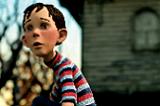 Monster House Think
what you will about me, but I don't really care about animation. Drop me before a classic like Pinocchio or lead me
to a modern masterpiece like The Wrong Trousers or the Toy Story duo or Spirited Away and I'm open to
having the same good time as everyone else, but unless the reviews are there, I'm staying home. Thank goodness, then, but
also no surprise, that reviewers were so kind to Monster House; where Cars was technically well-designed but
annoyingly soulless and unmemorable, and where Happy Feet marched to its own weird penguin drum, for better and for
worse, Monster House combined those virtues of aesthetic proficiency and off-kilter sensibility to much snazzier effect,
and without fetishizing itself or losing its connection to viewers, young or old. My biggest concern from the trailers was
that the central concept just didn't entice me much, but director Gil Kenan's team make the house so intricate and clever in
its villainy that my reservations wilted within minutes. Plus, for once, the voice cast only opted for celebrities where they
really had something to contribute (Maggie Gyllenhaal as a disaffected babysitter, Kathleen Turner as the bellowing building)
but found some charming, vocally engaging children to "play" the leads. Maybe the resolution doesn't stack up perfectly to
what came before it, but most movies would be lucky to have a quarter of the charm and visual invention that this one does.
Monster House Think
what you will about me, but I don't really care about animation. Drop me before a classic like Pinocchio or lead me
to a modern masterpiece like The Wrong Trousers or the Toy Story duo or Spirited Away and I'm open to
having the same good time as everyone else, but unless the reviews are there, I'm staying home. Thank goodness, then, but
also no surprise, that reviewers were so kind to Monster House; where Cars was technically well-designed but
annoyingly soulless and unmemorable, and where Happy Feet marched to its own weird penguin drum, for better and for
worse, Monster House combined those virtues of aesthetic proficiency and off-kilter sensibility to much snazzier effect,
and without fetishizing itself or losing its connection to viewers, young or old. My biggest concern from the trailers was
that the central concept just didn't entice me much, but director Gil Kenan's team make the house so intricate and clever in
its villainy that my reservations wilted within minutes. Plus, for once, the voice cast only opted for celebrities where they
really had something to contribute (Maggie Gyllenhaal as a disaffected babysitter, Kathleen Turner as the bellowing building)
but found some charming, vocally engaging children to "play" the leads. Maybe the resolution doesn't stack up perfectly to
what came before it, but most movies would be lucky to have a quarter of the charm and visual invention that this one does.
 Shut Up & Sing Maybe I was
so fully in agreement with the Dixie Chicks' anti-Bush sentiment, or so unacquainted with the Dixie Chicks beyond their album
covers, or both, that I just never realized what an enormous deal the stage patter heard 'round the world really was. Or maybe,
like the Chicks themselves, I was more invested for some alien, peculiar reason in the disgrace of the war, the corruption of the
administration, and the intensifying bifurcation of our two-toned Red and Blue "culture" than I was in what the Dixie Chicks
had to say about it. One of Shut Up & Sing's many badges of quality is that co-directors Barbara Kopple and Cecilia
Peck trace the PR fallout that the Dixie Chicks underwent and the political and creative renaissance they claimed for themselves
in response without losing sight of what a minor skirmish this represents amid bigger, graver battles. Along the way, Martie
Maguire, Natalie Maines, and Kelly Robison emerge as reflective, funny, formidable, and impressively talented women, trading
barbs and practicing their licks and lyrics on their way to creating the rousing, harmonious, but righteously angry music that
fills their new album, as well as the movie. Shut Up & Sing brims with one-liners, show-stoppers, and an inside look
at how intelligent, ambitious artists field the concerns of corporatized media, PR tangos, and fans who tend to want more of
the same. I laughed, I cried, I bought the album as soon as the movie was over.
Shut Up & Sing Maybe I was
so fully in agreement with the Dixie Chicks' anti-Bush sentiment, or so unacquainted with the Dixie Chicks beyond their album
covers, or both, that I just never realized what an enormous deal the stage patter heard 'round the world really was. Or maybe,
like the Chicks themselves, I was more invested for some alien, peculiar reason in the disgrace of the war, the corruption of the
administration, and the intensifying bifurcation of our two-toned Red and Blue "culture" than I was in what the Dixie Chicks
had to say about it. One of Shut Up & Sing's many badges of quality is that co-directors Barbara Kopple and Cecilia
Peck trace the PR fallout that the Dixie Chicks underwent and the political and creative renaissance they claimed for themselves
in response without losing sight of what a minor skirmish this represents amid bigger, graver battles. Along the way, Martie
Maguire, Natalie Maines, and Kelly Robison emerge as reflective, funny, formidable, and impressively talented women, trading
barbs and practicing their licks and lyrics on their way to creating the rousing, harmonious, but righteously angry music that
fills their new album, as well as the movie. Shut Up & Sing brims with one-liners, show-stoppers, and an inside look
at how intelligent, ambitious artists field the concerns of corporatized media, PR tangos, and fans who tend to want more of
the same. I laughed, I cried, I bought the album as soon as the movie was over.
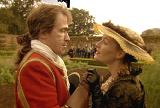 Tristram Shandy: A Cock and Bull Story This
year, I finally caught up with François Truffaut's beloved Day for Night, a film about a film crew that remains so
popular, 30 years after its production, that I was on two waiting lists for three weeks in two different video stores before
I finally got to see the movie. And what did I discover? As gossamer and smartly photographed as Day for Night is,
it's neither as frisky, as smart, or as joyously balanced as Michael Winterbottom's Tristram Shandy: A Cock and Bull Story,
which rambles along with a midsized crew as they feed the beast of Exportable Costume Drama that is apparently all the American
public wants from the British film industry. (Well, that and James Bond and scruffy comedies about workers or housewives
taking off their clothes, or the odd two-hour movie about Queen Elizabeth and Tony Blair chatting tensely on the phone.) Day
for Night knows full well that the film being made within the plot is utterly unremarkable, but Truffaut thus leaves a
yawning gap between his continental clichés about the artistic soul or the beauty of women and the arbitrary, shapeless
object on which these artists and women toil. Tristram Shandy works double-time as a brilliant, mordant read on the
uproarious and intimidating novel—the screenplay is hugely literate, but more than that, it is fleet, funny, and contemporary—and as
a cheeky satire of star egos, the porous line between dignity and sleaze on the loose organism of a movie set, and the uneasy
moment, rarely captured anywhere, when a team of artists see the final cut of the movie they've been slaving away at. "I can't
believe that was the whole fucking movie!" Gillian Anderson both gripes and laughs, in semi-character as herself, out of the
central story where she plays herself playing the Widow Wadman. All of this structural play makes terrific sense in the film
without asking to be called "postmodern" or "Borgesian"; it's simply the best, quickest, most hilarious way to tell this story,
drawing on the best possible cast, and governed by the right, iconoclastic, but accessible director.
Tristram Shandy: A Cock and Bull Story This
year, I finally caught up with François Truffaut's beloved Day for Night, a film about a film crew that remains so
popular, 30 years after its production, that I was on two waiting lists for three weeks in two different video stores before
I finally got to see the movie. And what did I discover? As gossamer and smartly photographed as Day for Night is,
it's neither as frisky, as smart, or as joyously balanced as Michael Winterbottom's Tristram Shandy: A Cock and Bull Story,
which rambles along with a midsized crew as they feed the beast of Exportable Costume Drama that is apparently all the American
public wants from the British film industry. (Well, that and James Bond and scruffy comedies about workers or housewives
taking off their clothes, or the odd two-hour movie about Queen Elizabeth and Tony Blair chatting tensely on the phone.) Day
for Night knows full well that the film being made within the plot is utterly unremarkable, but Truffaut thus leaves a
yawning gap between his continental clichés about the artistic soul or the beauty of women and the arbitrary, shapeless
object on which these artists and women toil. Tristram Shandy works double-time as a brilliant, mordant read on the
uproarious and intimidating novel—the screenplay is hugely literate, but more than that, it is fleet, funny, and contemporary—and as
a cheeky satire of star egos, the porous line between dignity and sleaze on the loose organism of a movie set, and the uneasy
moment, rarely captured anywhere, when a team of artists see the final cut of the movie they've been slaving away at. "I can't
believe that was the whole fucking movie!" Gillian Anderson both gripes and laughs, in semi-character as herself, out of the
central story where she plays herself playing the Widow Wadman. All of this structural play makes terrific sense in the film
without asking to be called "postmodern" or "Borgesian"; it's simply the best, quickest, most hilarious way to tell this story,
drawing on the best possible cast, and governed by the right, iconoclastic, but accessible director.
Honorable Mentions: The Devil Wears Prada, Mission: Impossible III,
Dreamgirls, the best scenes in For Your Consideration, the
rarefied but genuinely funny Police Beat, the opening hour of Shortbus,
Todd Louiso's scenes in Snakes on a Plane, and, for the generous delights of its bare-assed inadequacies, Basic Instinct 2.
(Images © 2006 MGM/Sony Entertainment; © 2006 Lions Gate Films/Starbucks Entertainment; © 2006 MGM/Sony Entertainment;
© 2006 Lions Gate Films/Lakeshore Entertainment; © 2005, 2006 Focus Features; © 2006 Warner Bros. Pictures;
© 2005, 2006 Pathé/Celador Films/Lions Gate Films; © 2006 Universal Pictures/40 Acres and a Mule;
© 2006 Sony Pictures Entertainment; © 2006 Cabin Creek Films/The Weinstein Company; and © 2005, 2006 BBC Films/Picturehouse Entertainment)


 Akeelah and the Bee Effectively distinguishing itself
from the recent run of spelling-bee entertainments, and also from your typical pre-teen flick, Akeelah offered simple
but plausible and appealing characters, and a satisfying, well-wrought script with its share of modest tests and turns.
Akeelah, charmingly played by Keke Palmer (a real actress, not just a smiling placeholder), brimmed with pluck, maturity,
and intelligence—the kinds of qualities I found sorely lacking Ofelia in Pan's Labyrinth, which is obviously a
completely different film, but which needed some of Akeelah's palpable sense of what childhood is, instead of some
stylized, highfalutin idea of what childhood represents. Without diminishing their inner lives or their credible conflicts, Akeelah
and her circle of friends and family provided warm, illuminating companionship for two hours; while congeniality is not an
inherently necessary quality in a movie, nor any kind of prerequisite for critical praise, I was impressed by the movie's
generosity and agility, even as it bumped up against some stereotypes (the Asian martinet) and softened some of its messier
edges (the gangster brother). I admit that I also enjoyed watching a movie that plays splendidly
to almost any age group, and the climactic spelling bee is a real nail-biter, for more reasons than you might expect.
Capsule Review
Akeelah and the Bee Effectively distinguishing itself
from the recent run of spelling-bee entertainments, and also from your typical pre-teen flick, Akeelah offered simple
but plausible and appealing characters, and a satisfying, well-wrought script with its share of modest tests and turns.
Akeelah, charmingly played by Keke Palmer (a real actress, not just a smiling placeholder), brimmed with pluck, maturity,
and intelligence—the kinds of qualities I found sorely lacking Ofelia in Pan's Labyrinth, which is obviously a
completely different film, but which needed some of Akeelah's palpable sense of what childhood is, instead of some
stylized, highfalutin idea of what childhood represents. Without diminishing their inner lives or their credible conflicts, Akeelah
and her circle of friends and family provided warm, illuminating companionship for two hours; while congeniality is not an
inherently necessary quality in a movie, nor any kind of prerequisite for critical praise, I was impressed by the movie's
generosity and agility, even as it bumped up against some stereotypes (the Asian martinet) and softened some of its messier
edges (the gangster brother). I admit that I also enjoyed watching a movie that plays splendidly
to almost any age group, and the climactic spelling bee is a real nail-biter, for more reasons than you might expect.
Capsule Review Casino Royale That opening pursuit, breathless and
brutal and high-flying, with acrobatics and aerial vistas just this side of heaven? The deliciously hammy elegance of the
poker game, rubbing up against the thrilling ambush in the hotel hallway? The sexy, mind-over-matter sparkle of Eva Green,
and the miracle by which Daniel Craig looks even better in clothes than out of them? The ruddy insolence of Bond's
personality, and of the movie's dogged reinvention of the character? For my money, James Bond was much more richly and
surprisingly "humanized" this year than Queen Elizabeth II was, and the film courts and rewards its audience succulently
without verging too much on the predictable. I wish the last third didn't sputter so badly; the romance and the action
and the centerfold physique spreads take on duller, sometimes crushingly literal forms, and too many characters start
crowding the story. Still, there's no denying the adrenal kick—or is it a direct shot to the heart?—behind
Casino Royale's best sequences and savviest impulses. From costumes to lighting to casting to fleeting gestures,
Casino had a strong hand and, for the most part, played it thrillingly.
Casino Royale That opening pursuit, breathless and
brutal and high-flying, with acrobatics and aerial vistas just this side of heaven? The deliciously hammy elegance of the
poker game, rubbing up against the thrilling ambush in the hotel hallway? The sexy, mind-over-matter sparkle of Eva Green,
and the miracle by which Daniel Craig looks even better in clothes than out of them? The ruddy insolence of Bond's
personality, and of the movie's dogged reinvention of the character? For my money, James Bond was much more richly and
surprisingly "humanized" this year than Queen Elizabeth II was, and the film courts and rewards its audience succulently
without verging too much on the predictable. I wish the last third didn't sputter so badly; the romance and the action
and the centerfold physique spreads take on duller, sometimes crushingly literal forms, and too many characters start
crowding the story. Still, there's no denying the adrenal kick—or is it a direct shot to the heart?—behind
Casino Royale's best sequences and savviest impulses. From costumes to lighting to casting to fleeting gestures,
Casino had a strong hand and, for the most part, played it thrillingly. Crank In any other year, Casino Royale would
stake an easy claim on the trophy for Best Scene Involving an Improbably Deployed Defibrillator, but in this and many other
ways, Crank has got the jump on everything else at the multiplex. One is hard-pressed even to conceive of a movie
with more delirious energy, or with a more patently ridiculous premise, but Crank is the rare, blissful film to take
genuine creative flight from its own absurdity, rather than simply hardening and besmirching the giddy, childish motivations
at its core. The actors, an odd gaggle ranging from Jason Transporter Statham to Dwight Sling Blade Yoakam to
Amy Rat Race Smart to Efren "Pedro" Ramirez are all more than game, but it's the high-velocity cleverness of the
direction that sweeps you into the film. Until you've seen a man smash a waffle iron onto his own hand to stay awake, and
been effortlessly persuaded to accept this spectacle as comedy, you haven't lived. Crank is the vigilante
revenge thriller that the filthy, perky ironists of Avenue Q might have made, and the gifts keep on coming through
the very last frame.
Crank In any other year, Casino Royale would
stake an easy claim on the trophy for Best Scene Involving an Improbably Deployed Defibrillator, but in this and many other
ways, Crank has got the jump on everything else at the multiplex. One is hard-pressed even to conceive of a movie
with more delirious energy, or with a more patently ridiculous premise, but Crank is the rare, blissful film to take
genuine creative flight from its own absurdity, rather than simply hardening and besmirching the giddy, childish motivations
at its core. The actors, an odd gaggle ranging from Jason Transporter Statham to Dwight Sling Blade Yoakam to
Amy Rat Race Smart to Efren "Pedro" Ramirez are all more than game, but it's the high-velocity cleverness of the
direction that sweeps you into the film. Until you've seen a man smash a waffle iron onto his own hand to stay awake, and
been effortlessly persuaded to accept this spectacle as comedy, you haven't lived. Crank is the vigilante
revenge thriller that the filthy, perky ironists of Avenue Q might have made, and the gifts keep on coming through
the very last frame. Dave Chappelle's Block Party When
this film inevitably appears on my Top Ten List for 2006, I will enthuse more directly about its potent but unpushy politics
of community, stressing a hopeful, homespun, temporary spirit of collectivity over instead of a broad or naïve utopianism.
I'll also have something to say about the impressively beautiful and artfully framed cinematography of Ellen Kuras, working
on the fly under uniquely boisterous circumstances. For now, though, I prefer to call attention to how goddamn fun this movie
is, wheeling amongst our inspired host's hilarious improvisations, rimshot jokes, rap battles, and picaresque interactions
with smalltown and big-city Americans of several stripes. Supplementing the humor are the fun throwaways within and around
the concert, provided by the artists (Erykah Badu tossing her enormous Afro-wig right off her head) as well as the audience
members (as when two black teenagers recount how they turned the other cheek from a racist diatribe on an Ohio golf course
so they wouldn't jeopardize their tickets to Dave's Brooklyn jam). My favorite moment in the movie, though, is without a doubt
the arrival of the reunited Fugees on Dave's stage, which drops with the energy and also the poignancy of a stitch-in-time
celebration, bestowing on the fleeting, present moment a relic of a very recent, possibly funkier, certainly more hopeful
past. Remember when we weren't at war, votes still counted, the vice president had a platform instead of a shotgun, and the
fu-gee-la was the way that we rocked when we were doing our thing? Want to live that spirit again, with spirit and soul?
Here's the movie for you.
Dave Chappelle's Block Party When
this film inevitably appears on my Top Ten List for 2006, I will enthuse more directly about its potent but unpushy politics
of community, stressing a hopeful, homespun, temporary spirit of collectivity over instead of a broad or naïve utopianism.
I'll also have something to say about the impressively beautiful and artfully framed cinematography of Ellen Kuras, working
on the fly under uniquely boisterous circumstances. For now, though, I prefer to call attention to how goddamn fun this movie
is, wheeling amongst our inspired host's hilarious improvisations, rimshot jokes, rap battles, and picaresque interactions
with smalltown and big-city Americans of several stripes. Supplementing the humor are the fun throwaways within and around
the concert, provided by the artists (Erykah Badu tossing her enormous Afro-wig right off her head) as well as the audience
members (as when two black teenagers recount how they turned the other cheek from a racist diatribe on an Ohio golf course
so they wouldn't jeopardize their tickets to Dave's Brooklyn jam). My favorite moment in the movie, though, is without a doubt
the arrival of the reunited Fugees on Dave's stage, which drops with the energy and also the poignancy of a stitch-in-time
celebration, bestowing on the fleeting, present moment a relic of a very recent, possibly funkier, certainly more hopeful
past. Remember when we weren't at war, votes still counted, the vice president had a platform instead of a shotgun, and the
fu-gee-la was the way that we rocked when we were doing our thing? Want to live that spirit again, with spirit and soul?
Here's the movie for you. The Departed
I don't really think of The Departed as a "return" to form for Martin Scorsese—not because I'm any more enamored
of the clod-hopping Gangs of New York or the inconsistent Aviator than I was when they
debuted, but because The Departed doesn't seem much like the movies Scorsese was making when consensus placed him at
the top of his game. Less bold and trenchant than Taxi Driver, less risky and introspective than New York, New York,
less aggressively virtuosic than Goodfellas, The Departed has the brilliant gleam but the limited depth of a
recently washed window, as well as a kinetic, mall-friendly awareness that what we're seeing is most of what we're getting;
the stakes and ideas don't extend much further than the screen.
Within those parameters, though, Scorsese recovers the same boundless energy and formal conviction that he brought to Cape
Fear, his last exercise in thrilling revisionism, and not coincidentally his biggest hit until The Departed. Edited
with snap, nerve, and deftly unpredictable rhythms by Thelma Schoonmaker (who seems just as liberated as Scorsese by backing away from
Oscar-bait material), acted by a cast who meld the spontaneous energy of first-take improvisers with the gravity and nuance
of a carefully rehearsed repertory company, The Departed commits with all of its considerable color and might to giving
everyone—the audience, the filmmakers, the Warner Bros. accountants—the best possible bang for their buck. And the
film's stamina is remarkable: just as we think the curtain is drawing near, Scorsese and scribe William Monahan keep calling third- and fourth-tier
characters into the spotlight, giving actors as good as Mark Wahlberg and Anthony Anderson a chance to alter our relationship
to the whole story. The original Infernal Affairs was comparably stylish and diverting, but not this delicious; it
didn't sate the moviegoing appetite as richly as The Departed does. Nearly everyone on screen dies, yes, but literally everyone in the theater wins.
The Departed
I don't really think of The Departed as a "return" to form for Martin Scorsese—not because I'm any more enamored
of the clod-hopping Gangs of New York or the inconsistent Aviator than I was when they
debuted, but because The Departed doesn't seem much like the movies Scorsese was making when consensus placed him at
the top of his game. Less bold and trenchant than Taxi Driver, less risky and introspective than New York, New York,
less aggressively virtuosic than Goodfellas, The Departed has the brilliant gleam but the limited depth of a
recently washed window, as well as a kinetic, mall-friendly awareness that what we're seeing is most of what we're getting;
the stakes and ideas don't extend much further than the screen.
Within those parameters, though, Scorsese recovers the same boundless energy and formal conviction that he brought to Cape
Fear, his last exercise in thrilling revisionism, and not coincidentally his biggest hit until The Departed. Edited
with snap, nerve, and deftly unpredictable rhythms by Thelma Schoonmaker (who seems just as liberated as Scorsese by backing away from
Oscar-bait material), acted by a cast who meld the spontaneous energy of first-take improvisers with the gravity and nuance
of a carefully rehearsed repertory company, The Departed commits with all of its considerable color and might to giving
everyone—the audience, the filmmakers, the Warner Bros. accountants—the best possible bang for their buck. And the
film's stamina is remarkable: just as we think the curtain is drawing near, Scorsese and scribe William Monahan keep calling third- and fourth-tier
characters into the spotlight, giving actors as good as Mark Wahlberg and Anthony Anderson a chance to alter our relationship
to the whole story. The original Infernal Affairs was comparably stylish and diverting, but not this delicious; it
didn't sate the moviegoing appetite as richly as The Departed does. Nearly everyone on screen dies, yes, but literally everyone in the theater wins. The Descent Neil Marshall's
spelunking nightmare isn't a literal remake like The Departed is, but you'd swear you've seen this movie at least a half-dozen
times before: endangered dames, dying flashlights, barely-glimpsed predators, sublimated rivalries figured as ghostly beasts.
Thankfully, what by all rights should feel like an opportunistic retread of Alien ground—or, worse, like a purgatorial
return to the moribund ground of The Cave—comes fabulously, frighteningly alive on-screen. I wouldn't want to make
extravagant claims on behalf of the writing, but the six women trapped beneath a few hundred meters of Appalachian soil do
translate as credible, particular people, making not just their plight but their tense histories and their desperate alliances
and betrayals into sites of real investment. In a sense, the cast only come into clear focus when things start to go wrong,
which is the exact juncture when many movies start swapping their banally differentiated characters into interchangeable carcasses.
The Descent looks great and is superbly paced, and it absolutely delivers the thrills, chills, and kills that it promises,
without falling casualty to the grossly popular Saw-style trend of torture as entertainment. The beats you see coming
in the narrative pay equal dividends to those you don't, and you won't soon forget the ending—which, for the record, I
prefer to the English original. Full Review
The Descent Neil Marshall's
spelunking nightmare isn't a literal remake like The Departed is, but you'd swear you've seen this movie at least a half-dozen
times before: endangered dames, dying flashlights, barely-glimpsed predators, sublimated rivalries figured as ghostly beasts.
Thankfully, what by all rights should feel like an opportunistic retread of Alien ground—or, worse, like a purgatorial
return to the moribund ground of The Cave—comes fabulously, frighteningly alive on-screen. I wouldn't want to make
extravagant claims on behalf of the writing, but the six women trapped beneath a few hundred meters of Appalachian soil do
translate as credible, particular people, making not just their plight but their tense histories and their desperate alliances
and betrayals into sites of real investment. In a sense, the cast only come into clear focus when things start to go wrong,
which is the exact juncture when many movies start swapping their banally differentiated characters into interchangeable carcasses.
The Descent looks great and is superbly paced, and it absolutely delivers the thrills, chills, and kills that it promises,
without falling casualty to the grossly popular Saw-style trend of torture as entertainment. The beats you see coming
in the narrative pay equal dividends to those you don't, and you won't soon forget the ending—which, for the record, I
prefer to the English original. Full Review Inside Man In the
cases of several Spike Lee movies, one hardly needs X-ray revision to spot the meridian running north-south through the movie,
partitioning the scenes and accents that are most organic to the material and those of which the primary goal is to keep the
director entertained, or to flatter his beliefs. One of the joys of Inside Man, then, is that these separate spheres
feel uncommonly well-fused—not just for a Spike Lee movie, but for any crowd-pleasing divertissement helmed by such a
talented and name-branded artist. Best of all, the "fusion" I am describing is culinary, not molecular: it's not that you
don't notice the film drawing on disparate energies or ranging across an unlikely array of tastes, but you'd have a hard time
removing any of these ingredients without fundamentally altering the dish. Thus, the jury stays out on whether Inside Man
commences with those ringing, opening chords of the Bollywood track "Chaiyya Chaiyya" for any reason beyond Spike Lee grooving
on a Bollywood track—but then, as the film increasing grounds its pleasures, its narratives, even its thematics in the
multicultural, heterogeneous landscape of modern New York, you see how well the soundtrack has served, even shaped, the movie.
An ebullient, playground spirit persists throughout, from Clive Owen's ingenious bout with a bank employee's cell-phone right
through that sexy, hat-twirling final shot. Is Inside Man the story of a crime prevented or a crime achieved? Of
hostages saved from peril or hostages entertained by the craft and smarts of their captors? Of Spike Lee reaching out to a
wider audience or of a wider audience finally "getting" Spike Lee? All of the above, brother-man.
Inside Man In the
cases of several Spike Lee movies, one hardly needs X-ray revision to spot the meridian running north-south through the movie,
partitioning the scenes and accents that are most organic to the material and those of which the primary goal is to keep the
director entertained, or to flatter his beliefs. One of the joys of Inside Man, then, is that these separate spheres
feel uncommonly well-fused—not just for a Spike Lee movie, but for any crowd-pleasing divertissement helmed by such a
talented and name-branded artist. Best of all, the "fusion" I am describing is culinary, not molecular: it's not that you
don't notice the film drawing on disparate energies or ranging across an unlikely array of tastes, but you'd have a hard time
removing any of these ingredients without fundamentally altering the dish. Thus, the jury stays out on whether Inside Man
commences with those ringing, opening chords of the Bollywood track "Chaiyya Chaiyya" for any reason beyond Spike Lee grooving
on a Bollywood track—but then, as the film increasing grounds its pleasures, its narratives, even its thematics in the
multicultural, heterogeneous landscape of modern New York, you see how well the soundtrack has served, even shaped, the movie.
An ebullient, playground spirit persists throughout, from Clive Owen's ingenious bout with a bank employee's cell-phone right
through that sexy, hat-twirling final shot. Is Inside Man the story of a crime prevented or a crime achieved? Of
hostages saved from peril or hostages entertained by the craft and smarts of their captors? Of Spike Lee reaching out to a
wider audience or of a wider audience finally "getting" Spike Lee? All of the above, brother-man. Monster House Think
what you will about me, but I don't really care about animation. Drop me before a classic like Pinocchio or lead me
to a modern masterpiece like The Wrong Trousers or the Toy Story duo or Spirited Away and I'm open to
having the same good time as everyone else, but unless the reviews are there, I'm staying home. Thank goodness, then, but
also no surprise, that reviewers were so kind to Monster House; where Cars was technically well-designed but
annoyingly soulless and unmemorable, and where Happy Feet marched to its own weird penguin drum, for better and for
worse, Monster House combined those virtues of aesthetic proficiency and off-kilter sensibility to much snazzier effect,
and without fetishizing itself or losing its connection to viewers, young or old. My biggest concern from the trailers was
that the central concept just didn't entice me much, but director Gil Kenan's team make the house so intricate and clever in
its villainy that my reservations wilted within minutes. Plus, for once, the voice cast only opted for celebrities where they
really had something to contribute (Maggie Gyllenhaal as a disaffected babysitter, Kathleen Turner as the bellowing building)
but found some charming, vocally engaging children to "play" the leads. Maybe the resolution doesn't stack up perfectly to
what came before it, but most movies would be lucky to have a quarter of the charm and visual invention that this one does.
Monster House Think
what you will about me, but I don't really care about animation. Drop me before a classic like Pinocchio or lead me
to a modern masterpiece like The Wrong Trousers or the Toy Story duo or Spirited Away and I'm open to
having the same good time as everyone else, but unless the reviews are there, I'm staying home. Thank goodness, then, but
also no surprise, that reviewers were so kind to Monster House; where Cars was technically well-designed but
annoyingly soulless and unmemorable, and where Happy Feet marched to its own weird penguin drum, for better and for
worse, Monster House combined those virtues of aesthetic proficiency and off-kilter sensibility to much snazzier effect,
and without fetishizing itself or losing its connection to viewers, young or old. My biggest concern from the trailers was
that the central concept just didn't entice me much, but director Gil Kenan's team make the house so intricate and clever in
its villainy that my reservations wilted within minutes. Plus, for once, the voice cast only opted for celebrities where they
really had something to contribute (Maggie Gyllenhaal as a disaffected babysitter, Kathleen Turner as the bellowing building)
but found some charming, vocally engaging children to "play" the leads. Maybe the resolution doesn't stack up perfectly to
what came before it, but most movies would be lucky to have a quarter of the charm and visual invention that this one does. Shut Up & Sing Maybe I was
so fully in agreement with the Dixie Chicks' anti-Bush sentiment, or so unacquainted with the Dixie Chicks beyond their album
covers, or both, that I just never realized what an enormous deal the stage patter heard 'round the world really was. Or maybe,
like the Chicks themselves, I was more invested for some alien, peculiar reason in the disgrace of the war, the corruption of the
administration, and the intensifying bifurcation of our two-toned Red and Blue "culture" than I was in what the Dixie Chicks
had to say about it. One of Shut Up & Sing's many badges of quality is that co-directors Barbara Kopple and Cecilia
Peck trace the PR fallout that the Dixie Chicks underwent and the political and creative renaissance they claimed for themselves
in response without losing sight of what a minor skirmish this represents amid bigger, graver battles. Along the way, Martie
Maguire, Natalie Maines, and Kelly Robison emerge as reflective, funny, formidable, and impressively talented women, trading
barbs and practicing their licks and lyrics on their way to creating the rousing, harmonious, but righteously angry music that
fills their new album, as well as the movie. Shut Up & Sing brims with one-liners, show-stoppers, and an inside look
at how intelligent, ambitious artists field the concerns of corporatized media, PR tangos, and fans who tend to want more of
the same. I laughed, I cried, I bought the album as soon as the movie was over.
Shut Up & Sing Maybe I was
so fully in agreement with the Dixie Chicks' anti-Bush sentiment, or so unacquainted with the Dixie Chicks beyond their album
covers, or both, that I just never realized what an enormous deal the stage patter heard 'round the world really was. Or maybe,
like the Chicks themselves, I was more invested for some alien, peculiar reason in the disgrace of the war, the corruption of the
administration, and the intensifying bifurcation of our two-toned Red and Blue "culture" than I was in what the Dixie Chicks
had to say about it. One of Shut Up & Sing's many badges of quality is that co-directors Barbara Kopple and Cecilia
Peck trace the PR fallout that the Dixie Chicks underwent and the political and creative renaissance they claimed for themselves
in response without losing sight of what a minor skirmish this represents amid bigger, graver battles. Along the way, Martie
Maguire, Natalie Maines, and Kelly Robison emerge as reflective, funny, formidable, and impressively talented women, trading
barbs and practicing their licks and lyrics on their way to creating the rousing, harmonious, but righteously angry music that
fills their new album, as well as the movie. Shut Up & Sing brims with one-liners, show-stoppers, and an inside look
at how intelligent, ambitious artists field the concerns of corporatized media, PR tangos, and fans who tend to want more of
the same. I laughed, I cried, I bought the album as soon as the movie was over.
 Tristram Shandy: A Cock and Bull Story This
year, I finally caught up with François Truffaut's beloved Day for Night, a film about a film crew that remains so
popular, 30 years after its production, that I was on two waiting lists for three weeks in two different video stores before
I finally got to see the movie. And what did I discover? As gossamer and smartly photographed as Day for Night is,
it's neither as frisky, as smart, or as joyously balanced as Michael Winterbottom's Tristram Shandy: A Cock and Bull Story,
which rambles along with a midsized crew as they feed the beast of Exportable Costume Drama that is apparently all the American
public wants from the British film industry. (Well, that and James Bond and scruffy comedies about workers or housewives
taking off their clothes, or the odd two-hour movie about Queen Elizabeth and Tony Blair chatting tensely on the phone.) Day
for Night knows full well that the film being made within the plot is utterly unremarkable, but Truffaut thus leaves a
yawning gap between his continental clichés about the artistic soul or the beauty of women and the arbitrary, shapeless
object on which these artists and women toil. Tristram Shandy works double-time as a brilliant, mordant read on the
uproarious and intimidating novel—the screenplay is hugely literate, but more than that, it is fleet, funny, and contemporary—and as
a cheeky satire of star egos, the porous line between dignity and sleaze on the loose organism of a movie set, and the uneasy
moment, rarely captured anywhere, when a team of artists see the final cut of the movie they've been slaving away at. "I can't
believe that was the whole fucking movie!" Gillian Anderson both gripes and laughs, in semi-character as herself, out of the
central story where she plays herself playing the Widow Wadman. All of this structural play makes terrific sense in the film
without asking to be called "postmodern" or "Borgesian"; it's simply the best, quickest, most hilarious way to tell this story,
drawing on the best possible cast, and governed by the right, iconoclastic, but accessible director.
Tristram Shandy: A Cock and Bull Story This
year, I finally caught up with François Truffaut's beloved Day for Night, a film about a film crew that remains so
popular, 30 years after its production, that I was on two waiting lists for three weeks in two different video stores before
I finally got to see the movie. And what did I discover? As gossamer and smartly photographed as Day for Night is,
it's neither as frisky, as smart, or as joyously balanced as Michael Winterbottom's Tristram Shandy: A Cock and Bull Story,
which rambles along with a midsized crew as they feed the beast of Exportable Costume Drama that is apparently all the American
public wants from the British film industry. (Well, that and James Bond and scruffy comedies about workers or housewives
taking off their clothes, or the odd two-hour movie about Queen Elizabeth and Tony Blair chatting tensely on the phone.) Day
for Night knows full well that the film being made within the plot is utterly unremarkable, but Truffaut thus leaves a
yawning gap between his continental clichés about the artistic soul or the beauty of women and the arbitrary, shapeless
object on which these artists and women toil. Tristram Shandy works double-time as a brilliant, mordant read on the
uproarious and intimidating novel—the screenplay is hugely literate, but more than that, it is fleet, funny, and contemporary—and as
a cheeky satire of star egos, the porous line between dignity and sleaze on the loose organism of a movie set, and the uneasy
moment, rarely captured anywhere, when a team of artists see the final cut of the movie they've been slaving away at. "I can't
believe that was the whole fucking movie!" Gillian Anderson both gripes and laughs, in semi-character as herself, out of the
central story where she plays herself playing the Widow Wadman. All of this structural play makes terrific sense in the film
without asking to be called "postmodern" or "Borgesian"; it's simply the best, quickest, most hilarious way to tell this story,
drawing on the best possible cast, and governed by the right, iconoclastic, but accessible director.